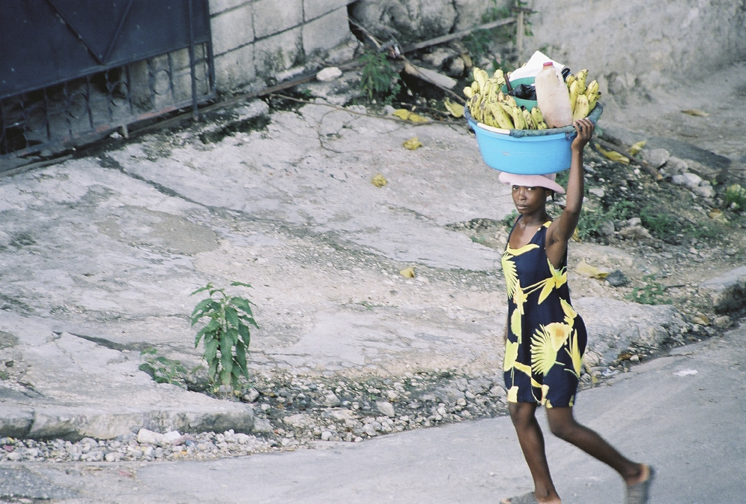 |
||||
Still from Poto Mitan: Haitian Women, Pillars of the Global Economy. |
||||
Journal Issue 2.1
Spring 2010
Edited by Deanna Utroske, Julie Ann Salthouse, Jillian Hernandez, and
Karen Alexander
Editorial Assistant: Katherine O’Connor
Poto Mitan: Haitian Women, Pillars of the Global Economy. Directed by Renée Bergan and Mark Schuller. New York: Tet Ansanm Productions, 2009.
Reviewed by Régine Jean-Charles
“It’s never been good here, but now it’s really bad.” These are the words of Solange, a poor Haitian woman living in Port-au-Prince, the capital of Haiti. While this could easily be a reference to life in the city since the earthquake in January, Solange’s story was recorded two years prior, for the powerful documentary Poto Mitan: Haitian Women, Pillars of the Global Economy. The term poto mitan translates into English as “central pillar,” and has often been used to describe the role that Haitian women play in society. Using the narratives of five women, the film tells a story of poverty, hardship, struggle, and injustice suffered by these women of Port-au-Prince. Directors Renée Bergan and Mark Schuller confront a range of topics that are well known to those familiar with Haitian economics and politics—the widespread political repression and rape of women following the first coup against former president Jean-Bertrand Aristide; the negative results of U.S. military intervention; and the enormous chasm between Haiti’s rich and poor. Bergan and Schuller also address the deleterious effects of globalization that have not received much attention. For example, they expose the rampant abuse of factory workers and show how trade barriers on Haitian agriculture resulted in overdependence on imported foods such as rice, which, though produced on the island, cost far more than the inexpensive imports. Thus the film explains exactly how U.S. trade policies contributed to the destruction of local Haitian agriculture.
The film uses different techniques that draw from the richness of Haitian cultural forms as well as the beauty of the landscape throughout. The adept storytelling of writer Edwidge Danticat punctuates each section of the film through narration set against the dramatization of a woman braiding her daughter’s hair. The sonorous melodies of Emeline Michel are present along with music by Boukman Eksperyans. There are also interviews with public figures such as the former Minister of Women’s Rights, Marie Laurence Lassègue. But the women’s personal stories form the cornerstone of the film and give it authority.
Solange, Marie-Jeanne, Frisline, Hélène, and Thérèse are the “five brave poto mitan who requested to have their stories told,” and their stories reveal how women do more than struggle. These women create resolutions to their problems, offer political critique and analysis, lead their families, and empower the young women of their communities. Thus despite difficult images and sad stories, the film’s message is that Haitian women are agents of transformation. They were in the past, as the examples of historical figures Anacaona, Defilée, and Catherine Flon demonstrate. They are in the present, as the documentary’s protagonists attest, and they will be in the future, despite the immeasurable losses of the earthquake’s devastation. “Women used to think that they were second-class people. But women are important. Women are the bouillon, without them there would be no taste. We are an essential ingredient,” says Thèrése. Poto Mitan contributes to ensuring that this importance not be forgotten by revealing how globalization and development affect Haitian women as well as how they are responding to these issues in quotidian life.1
Régine Michelle Jean-Charles is an assistant professor of African and African Diaspora Studies and Romance Languages and Literatures at Boston College. Her current book manuscript is on sexual violence in Caribbean and African literatures and cultures. She is also a board member and performer for A Long Walk Home, Inc., a nonprofit organization that uses art therapy and visual and performing arts to document, to educate, and to bring about social change by helping victims of trauma heal and by increasing public awareness about community violence.
Copyright © 2014. All rights reserved.